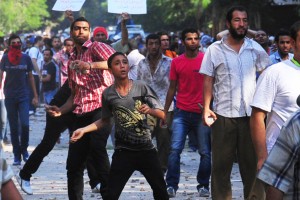
Hundreds of supporters and detractors of President Mohamed Morsy clashed Friday in Tahrir Square and its surrounding streets, hurling rocks, home made masonry mortar explosives and Molotov cocktails at each other. Over 110 people were injured according to state reports.
The clashes started at noon when supporters of Morsy and the Muslim Brotherhood destroyed a stage set up by members of the Socialist Popular Alliance Party for criticising the president.
Both sides engaged in light physical clashes, which sometimes involved rocks being thrown with the anti Morsy crowd stationed in Mohamed Mahmoud Street and the president’s supporters in Tahrir Square.
The stage was rebuilt and subsequently destroyed again which led to renewed, heavier clashes with each group regularly making charges at the other to drive them further back. There were several attempts at ceasefires with protesters on each side chanting “peaceful” and “one hand” but each was broken.
The clashes eventually led to uneasy truce with each side staying at their side, although small bouts of rock throwing on either side occasionally broke out.
The Morsy supporters at that point had a numerical advantage, numbering in the thousands, although only a minority of hundreds clashed with the other side.
Several marches organised by many secular and progressive political groups including Al-Dostor Party, the Socialist Popular Alliance Party, the Revolutionary Socialists and the April 6 Youth Movement (Democratic Front) made their way to Tahrir Square from different areas of Cairo including Giza Square, Shubra and Mostafa Mahmoud Street.
The Mostafa Mahmoud march, led by leftist leader Kamal Khalil, was the largest. It made its way through Dokki Street from the Mohandiseen area before entering Tahrir Square via Qasr Al-Nil Bridge.
The arrival of the several marches gave the anti-Morsy protestors a numerical advantage and his supporters initially appeared to be retreating.
Around that time, at 3:14 pm, Essam El-Erian, acting and deputy chairman of the Brotherhood’s political wing, the Freedom and Justice Party, called on all members and supporters to leave Tahrir and head to the High Court building for a protest scheduled by the Brotherhood. Secular groups had control of the square and surrounding streets at that point.
Less than an hour later, however, supporters of Morsy and the Brotherhood returned with greater numbers and clashes resumed. Rocks were thrown again and there was use of homemade masonry mortar explosives on the pro-Morsy side.
Pro-Morsy protestors pushed the opposition protesters back into Mohamed Mahmoud Street where more rock throwing occurred. Both sides also made extensive use of Molotov cocktails. Protesters on Mohamed Mahmoud Street also lit car tyres on fire.
After about an hour of intense fighting, the Muslim Brotherhood and Morsy supporters retreated again and the anti-Morsy crowd moved back into the square. Fighting has since resumed, however.
At least 51 people were injured, with 47 being taken to Al-Mounira hospital and four to the Qasr Al-Ayni hospital. Injuries included head and eye injuries. There were no reported deaths.
Muslim Brotherhood leader and FJP secretary general in Cairo, Mohamed El-Beltagy, also called on Brotherhood members in Tahrir to retreat while the Brotherhood’s official English language Twitter account announced that there were no members of the group present at the square.
Several liberal and leftist groups scheduled protests for this Friday in Tahrir Square over two weeks ago, rejecting the current draft presented by the Constituent Assembly tasked with drafting the country’s new constitution and calling for its dissolution and the formation of another that adequately represents all segments of Egyptian society.
Following the announcement of the court verdict in the Camel Battle trial where the judge acquitted all the defendants, the Muslim Brotherhood also called for a large protest this Friday, also in Tahrir Square.

